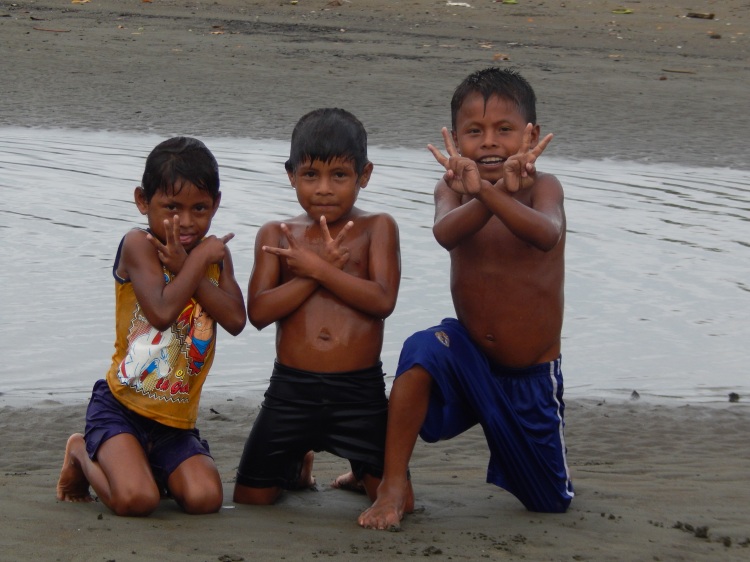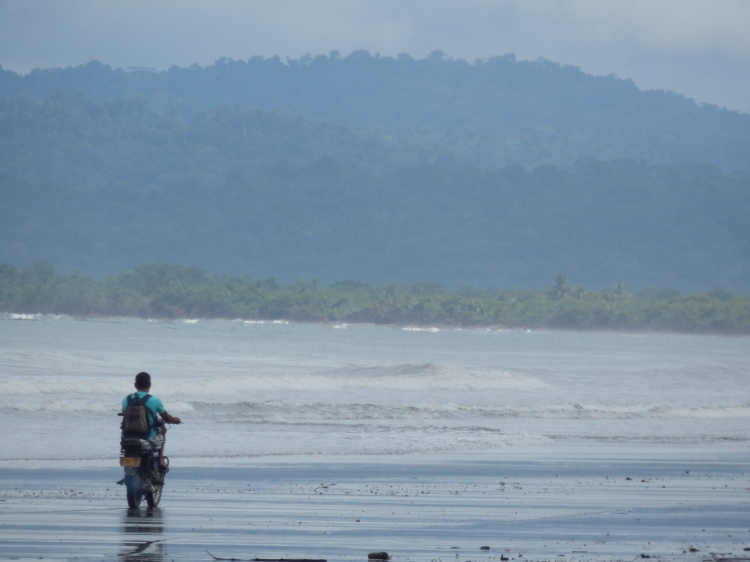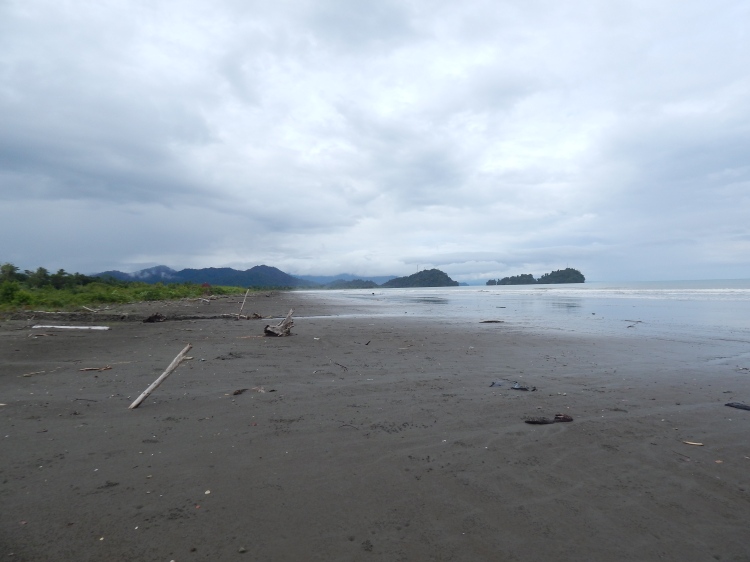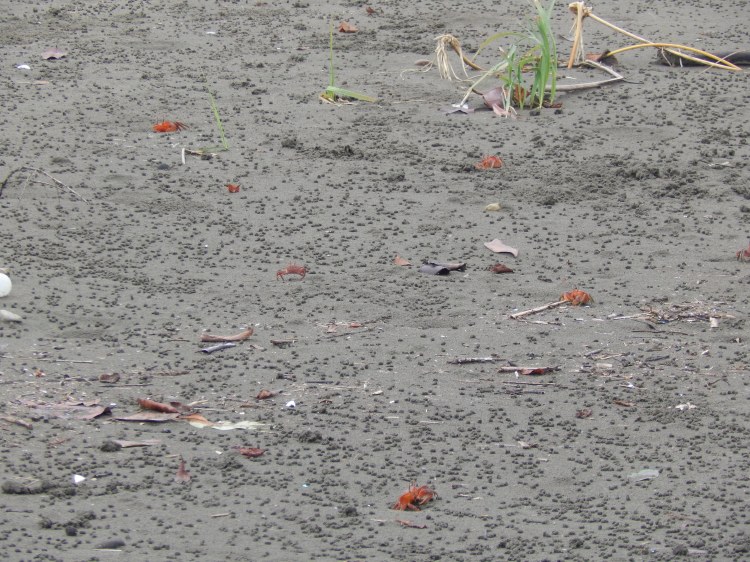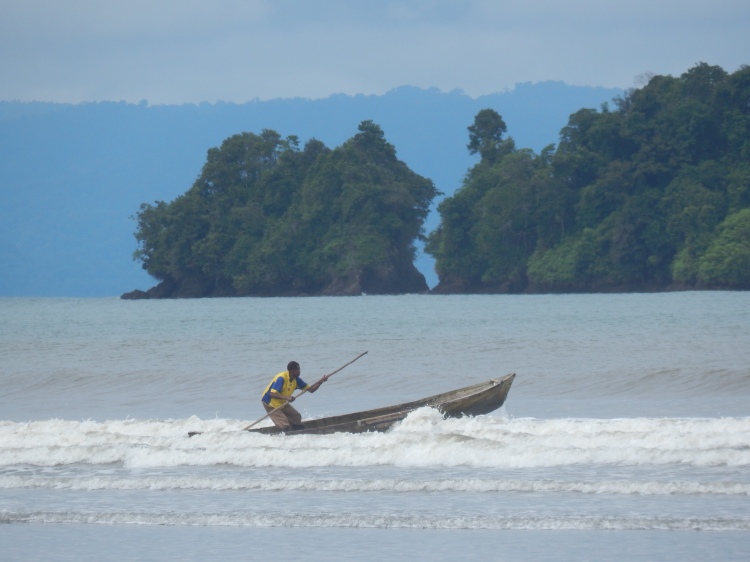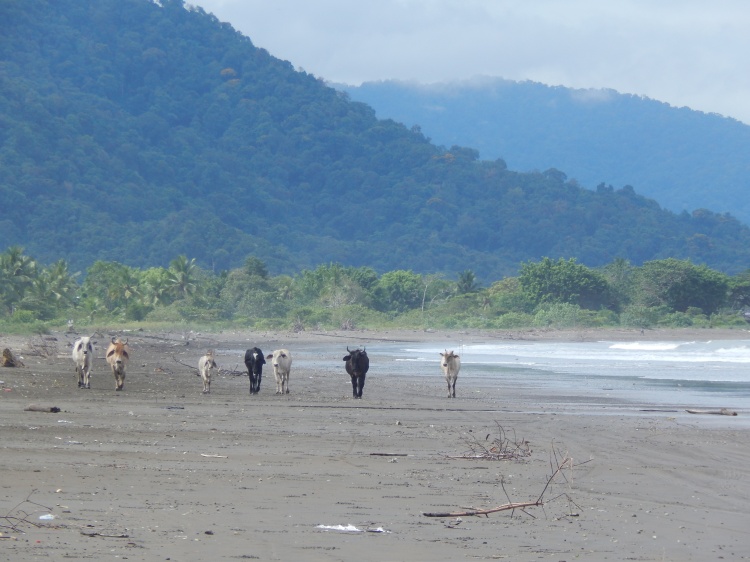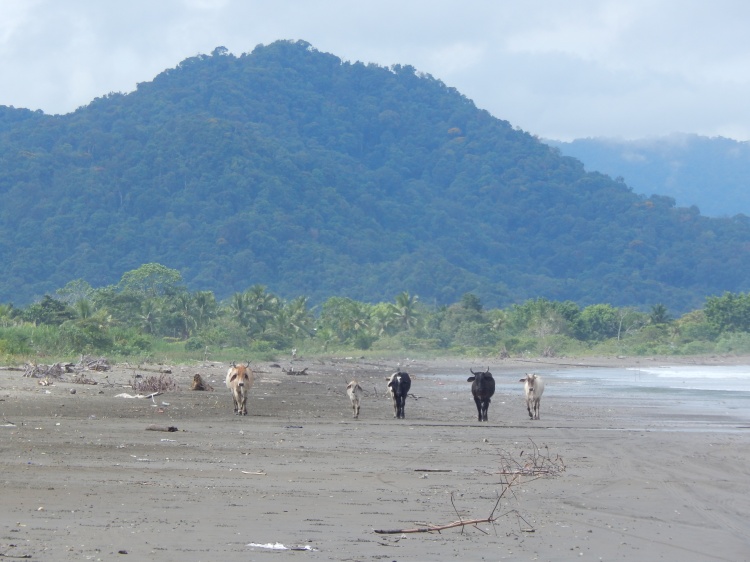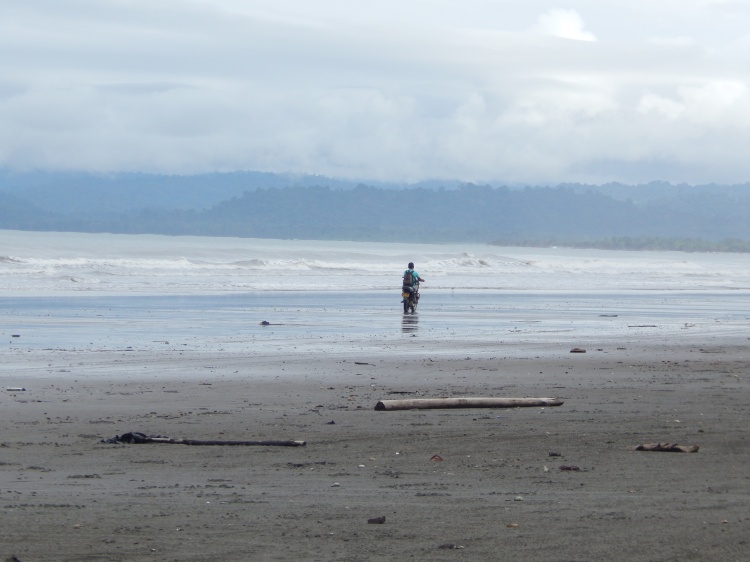I wake up in Medellin, tired but ready for a new adventure after a wondrous week in Guatape. My day/week pack is ready and I call a taxi to The Black Sheep Hostel after storing my bigger bag. Not 15 minutes later I’m at the local city airport of Medellin my wallet only 5,800 pesos lighter. I check in with my flight bound for Nuqui on Satena airlines (160 CAD round trip).
After a quick and far from thorough security check I’m waiting at the gate ready to board. We’re led out to a tiny 17 seater plane and climb on board but not before being handed a set of earplugs and a juice box. As we board I chat with an English girl whose spent the last dozen years living and teaching English in Colombia. She’s the closest thing to another foreigner on the plane and passes on a little good info about Nuqui and the coast. She’s on her way there to teach a week long course of English for tourism purposes. Choco Province is definitely behind the rest of Colombia when it comes to embracing tourism but they are learning and working hard at it, so get there now before this hidden paradise is overrun.
We land and step out into tropical paradise, in the run down coastal center of Nuqui. At first I’m relieved, the heat is nothing compared to what it was on the Carribean. As I walk through the small town and say goodbye to my friend who is off to her hotel I re-assess. It might not be that hot, but the humidity is absolutely absurd, and I’m drenched in sweat by the time I reach my turn off the one paved road in town.
I have little in terms of plans in mind, just knowing I want to explore the coast as best I can for the next week. I wander through the ramshackle town, greeted by big friendly smiles from the grownups and curious heavy handed stares by the children. A few words and a smile changes those stares to more wide welcoming grins.
With the help of two young boys I weave through some back alleys and find my way to the Lancha (boats that connect the coastal communities) dock. They happily run off playing together and I assess my options. I know at some point I want to go north to El Valle where The Humpback Turtle hostel is, if only for it’s name, but a friendly lancha captain tells me that the next boat that far north is not until Friday morning at 6am. (The boat runs from Nuqui to El Valle and Bahia Solano Monday and Friday leaving Nuqui at 6 am and Leaving El Valle to come back at Noon.)
That option of the table I decide to follow a whispered word from a single blog and head to Arusi, the southernmost stop on the daily lancha route and somewhere firmly off the tourist trail. My friend the boat captain approves whole heartedly and informs me he is from Arusi. He then accompanies back into the centre of Nuqui and helps me to find a huge bottle of water, since in Arusi safe drinking water can be hard to find. About an hour later I’ve climbed in the crowded motor boat happily chatting with a few Colombian tourists and even more locals.
The pacific ocean is hardly a swimming pool and it’s a rough ride in the small motorboat climbing and falling over the countless swells of the open ocean. We make a dew stops and take on more than a little water as we attempt rough docks at the beach, I’m just glad I have my drag bag, and wits enough to hold my valuables up high.
After a little over an hour the boat pulled into to yet another endless beach bringing me, a few locals and the boats captain to our destination. The boat captain points out his house and tells me if I need anything before getting a local teenager to lead me to where I should stay. We chat in spanish as we walk and he leaves me at Casa Colibri, a charming home and gasoline business run by Ana Maria. Definitely a place to stay if you want a warm welcome, before long I’d been introduced to her mother and half of her friends not to mention her three cats and three dogs who help to make the place very welcoming. Of course the hostess herself did this
For right now there’s just one room there, but Ana Maria hopes to build a few more. Either way I booked myself in for 70,000 COP including three delicious home cooked meals and then quickly set off out along the beach with the company of a friendly black lab named Mono who seems to adore little so much as the game of fetch and trying to eat the wooden sticks used.
The beach is endless and rugged. The pacific certainly lacks the white sand pristine beauty of Caribbean coast, but it holds something else, a sense of wildness, the jungle encroaching straight to the edge of the beaches, at high tide just a few feet of sand separating the crashing waves from the dense, wet plant life of the jungle. When i say wet, I mean really wet, the pacific coast of Colombia is one of the most rain soaked regions in the entire world.
As the sun sets I head back along the endless beach towards the tiny town and am welcomed warmly by a few of the locals, including a young man named Fred who is eager to practice his English. I join in helping a few locals push a boat up the beach over logs to keep it out of the tides long reach.
After the exertion and a few long and friendly if difficult spanish conversations I sit down to watch a stunning sun set, the last of the locals returning home along the beach. Eventually, I’m called in to Casa Colibri for dinner, which is actually somewhat challenging endeavour what with three acrobatic cats, a few begging dogs and all the fish bones. Still the tuna was absolutely delicious and more than filling. By 8 oclock everyone is heading to bed and I’m joining, knowing the lancha back to Nuqui leaves at 6 am sharp. Quickly I find I’m falling into the pacific lifestyle, often early to bed but always up early too. It seems natural and certainly makes more sense than my habits in Canada.
I wake up the next morning greeted by a delicious breakfast of arroz de coco (Coconut rice) and a beaming Ana Maria. I tell her I hope one day I will come back and I certainly hope I do. If you find yourself in the pacific coast of Colombia, check out Arusi. Just before leaving she hands me the register for me to fill out. I smile and do so but I can’t help but notice the last registered guest was back in August. Tourism in Choco is growing, but slowly, and it’s still very much a wild and off the beaten path destination, but one that’s most definitely worth it.
We reach Nuqui before 8 am and, after confirming my place on the next morning’s boat to El Valle, I set out to find Horatio and Jeanette’s, a place recommended by Ana Maria. I wander back towards the beach and ask a friendly local who walks me right to their door with a smile on his face. I’m greeted warmly and shown a private room with a big, but hard bed, tv and fan all for 20,000 COP per night. It’s perfect and, after dropping my stuff I head out to the beach.
Nuqui has a reputation for being a bit of a hole, and sure, just outside the town the beach is dirty, and sure the town itself is a little ramshackle and past it’s prime, but it’s a warm and happy place that I quickly fall in love with. The locals eager to greet me and beyond helpful, people are often singing and dancing in the street, there is an absurd ratio of children to adults.
Heading out away from town the dirty beach quickly transforms to near pristine condition, and fills with crabs, countless red dots on the horizon in front of me, which disappear in waves as I step towards them. I continue along out past a few eco lodges and towards still more remote reaches of the beach. The tide makes a massive difference and the locals use the firm sand the ebbing waters leave behind as a road of sorts, mainly for Moto’s but in the few hours of walking I do see a broken down old car or two speeding past me.
Eventually I take a seat on one of countless pieces of driftwood washed up on the beach. The longer I stay motionless the more crabs reappear in their wholes around me, staring up nervously, and flinching back into hiding at the slightest movement from me. I sit and read for a while, only pulling my head out of Joe Abercrombie’s first Law Trilogy to wave and smile at the occasional passing local.
The sun is well into it’s slow fall from the sky by the time I put the book away, take out my Ipod and head back along the beach singing as I go, glad of the isolation of the beach, not so much for me, but for the others who might potentially have to suffer through the ordeal of hearing me sing. Of course I am not without an audience entirely, as I am met by a procession of cows heading who knows where. They give me a wide berth, possibly because of my singing, possibly not.
By the time I make it back the tide has gone way out and near the town, huge flats of sands previously covered by the pacific are now full (well sparsely populated) with children playing in the sand and in shallow inlets of water left behind by the tide. I walk out along those flats, staring across the narrow gap at two islands which jut up out of the water somewhere between the river mouth and the ocean itself. I find myself wishing for a little more sunlight so I could try a swim, but instead I head back along the huge sand towards town and past some kids kicking around a football (soccer).
Just past them are three kids playing in a massive tide pool in the sand, they see me walking by and, even though my camera is in my backpack and not at all visible, they smile and wave and me and shout “Foto, Foto.”
I shrug my shoulders and smile back. After confirming what they want I open up my backpack and take out my camera. The kids pose and quickly rush to me in between each shot to see themselves on the LCD screen. There is laughter, shouts of joy, and wide smiles that cut across their whole faces. I find my face is mirroring their expressions as they ask me to take photos of them playing in the water and then tear off at a full run into the knee deep water, lunging at each other and laughing as they roll around in it.
The older kids playing football seem to leave their shyness behind seeing me laughing and playing with the younger kids and call me over to play some football. I manage, with incredible focus and great effort, not to humiliate myself at all as we pass the ball around and take a few shots on each other into a net made by two sticks pitched in the sand. All the kids lose their mind when I make a diving save against one of them and I smile and climb up, doing my best to dust my sand from everywhere with limited success.
Eventually they are starting a game and my stomach is rumbling so I excuse myself and continue back into town, accompanied by two of the three young children from the water. They follow and chatter at me, I do my best to hold my own, pleased by how far my spanish has come in under two months. There’s still undoubtedly a long way to go, but without noticing I’ve gone from incompetent to just barely competent, and that’s a big step.
As we reach the edge of town we meet two more older boys who have a slingshot and some bottles lined up. I’m amazed as they hit the target at 20 paces first shot. then the extend the slingshot to me. I miss my first shot by a good five feet, but they insist I take another, carefully coaching me in deliberate spanish. boom my second shot crashes into a bottle and I feel only a slight flush of guilt at the broken glass on the concrete. They applaud and seem surprised then keep shooting which assuages my guilt, they’re not planning to leave any of those 5 bottles unbroken anyway.
My two miniature tour guides follow me into town pointing out the police station, and the church and countless other small buildings, finally leading me to their home where I meet more friendly children, though no adults are to be seen. I let them follow me out into the street and then quickly give them each a pen and a few pesos without being asked, since they’ve been such wonderful company and definitely look like they could use both things. I don’t like giving money all the time, but here I feel okay about doing so in small quantities, especially when the kids have not even asked for it.
They grin and thank me each with a rough and quick hug before we say our goodbye’s and I find my way through the poorer regions of Nuqui with a smile on my face, heading back towards the main streets in the ever growing darkness. As the last glimmers of light fade from the now cloudy sky I settle down at a tiny hole in the wall and order carne a la plancha, knowing anything other than fish will be a rarity for the next week. I meet a few new friends both young and old sitting at the restaurant, including an old man who speaks decent english and is rightly proud of the achievement.
An hour later both my hunger for food and hunger for conversation fully sated I amble across the street to say hello to the first foreign faces I’ve seen all day, four tourists sitting outside a restaurant across the way. Three of them our on their way off the coast but Cassie from Australia is randomly taking the same boat as me the next morning. After some brief conversation we agree to meet at the boat and I head off to get some sleep ahead of my my 5:15 am wake up the next day. So far the pacific has provided near endless excitement and perhaps the friendliest Colombians yet. I drift off to sleep on a hard but comfortable bed eager for further adventures.
